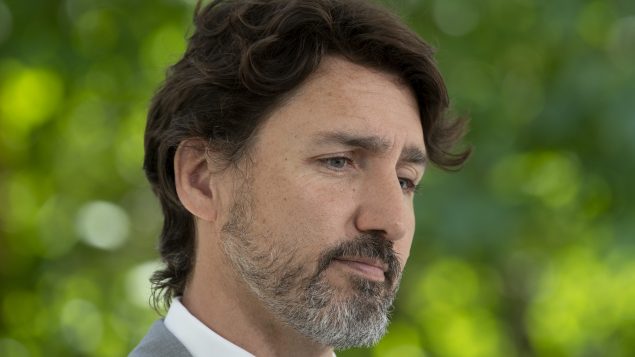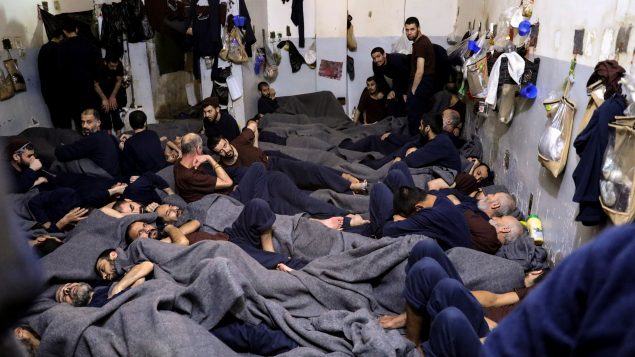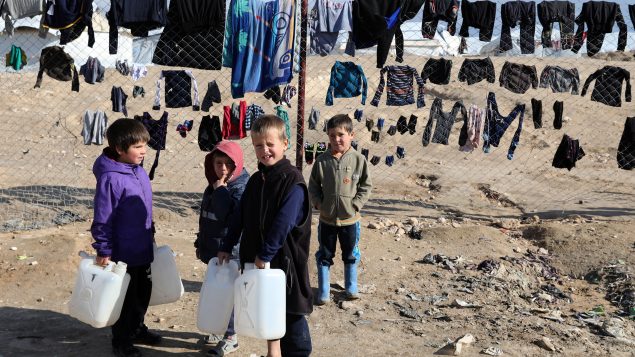An international human rights group is urging the federal government to “immediately” repatriate dozens of Canadians, including 26 children, held in detention facilities for ISIS suspects in northeastern Syria for “rehabilitation, reintegration, and, as appropriate, prosecution.”
Human Rights Watch says the federal is failing to take adequate steps to repatriate these Canadians and is actively discriminating against them by withholding effective consular assistance to them and to their families in Canada.
In a 92-page report released Monday, Human Rights Watch says these Canadians – eight men, 13 women, and 26 children – have been detained for more than a year in “overcrowded, filthy, and life-threatening conditions.”
Most of the children are under age six, including a five-year-old orphan, according to the report titled Bring Me Back to Canada.
“Abandoning citizens to indefinite, unlawful detention in filthy, overcrowded and dangerous camps and prisons does not make Canada safer,” said Letta Tayler, a senior researcher at Human Rights Watch and author of the report. “The lives of Canadians are on the line, and the time to bring them home is now.”
Concern for safety of Canadian officials ‘top of mind’

Prime Minister Justin Trudeau participates in a news conference outside Rideau Cottage in Ottawa, Monday, June 29, 2020. (Adrian Wyld/THE CANADIAN PRESS)
Speaking to reporters in Ottawa, Prime Minister Justin Trudeau said Canada’s ability to offer consular assistance to these detained Canadians is hampered by the lack of Canadian diplomatic and military presence on the ground in Syria and that safety and security of Canadians officials is “top of mind” for the federal government.
“We have a responsibility as a government to ensure that Canadian citizens, particularly employees are not put into danger, are not exposed to grave situations,” Trudeau said.
“Syria is an area where we do not have any diplomats or any Canadians on the ground and therefore we work through intermediaries to try and provide consular assistance as best as we can.”
Tayler said while she doesn’t want to make light of the security situation on the ground in northern Syria, she was able to travel to the region to prepare the report last year.
“The thing I really had to worry about in Al-Hol Camp was bringing enough sunscreen,” Tayler said in response to a question from Radio Canada International about the logistics of getting into the areas of northeastern Syria controlled by the Kurdish-led coalition forces.
“Of course, there are risks, but many, many journalists, many human rights researchers and indeed many government officials from countries around the world have travelled into northeast Syria and back without incident.”
‘The problem is not logistics’

A child is held by a woman inside a shop in al-Hol camp, Syria, Jan. 8, 2020. (Goran Tomasevic/REUTERS)
Farida Deif, Canada director of Human Rights Watch, said the Kurdish-led coalition that governs northeast Syria and controls the camps and prisons in the area wants Canada to take its citizens home.
They have signalled that they are ready to work with intermediaries if federal officials can’t get into Syria and the U.S. military has also offered to assist in repatriating foreign ISIS suspects and family members, Deif said.
“In short, the problem here is not logistics, it is fundamentally one of political will,” Deif said.
Tayler said conditions in the camps she visited during her trips to Syria last summer are horrific.
“There I saw overflowing latrines and sewage running into tents where young children lay on the ground with bloated bellies, ribs sticking out and flies on their faces,” Tayler said. “Aid workers and detainees tell us that conditions are just as bad today.”
The Canadians are frequently ill, and most are traumatized, according to family members and detainees Human Rights Watch has spoken with, Tayler said.
Three of the adults say that ISIS imprisoned them. One said ISIS captors raped her and she is on a “kill list” for not supporting the group, according to the report.
Another said he was tortured in a prison.
None of the Canadians have been charged with any crime, or even brought before a judge to review the legality and necessity of their detention, according to Human Rights Watch.
The Canadians are among nearly 14,000 non-Iraqi foreigners from more than 60 countries held in northeast Syria for suspected ISIS links.

Foreign prisoners, suspected of being part of the Islamic State, lie in a prison cell in Hasaka, Syria, Jan. 7, 2020. (Goran Tomasevic /REUTERS)
Men and older boys suspected of ISIS ties are held in separate makeshift prisons in inhumane conditions, with detainees packed in so tightly that many must sleep shoulder to shoulder, according to people who visited these facilities, Tayler said.
Children who lived under ISIS and any women trafficked by ISIS should be treated first and foremost as victims, Tayler said.
“Abandoning citizens to indefinite, unlawful detention in filthy, overcrowded, and dangerous camps and prisons does not make Canada safer,” Tayler said. “Instead, it can fuel despair and violent radicalization, and punishes innocent children for any crimes of their parents.”
Canada is concerned about the plight of children, officials say
Barbara Harvey, a spokesperson for Global Affairs Canada, said the federal government is
aware of Canadian citizens being detained by Kurdish authorities in northeast Syria and is particularly concerned with cases of Canadian children in Syria.
“Given the security situation on the ground and the current COVID-19 context, the Government of Canada’s ability to provide any kind of consular assistance in Syria remains extremely limited,” Harvey said in a statement.
“Canadian consular officials are actively engaged with Syrian Kurdish authorities to seek information on Canadians in their custody. We continue to monitor the situation very closely.”
Due to provisions of the Privacy Act, no further information can be disclosed, she added.
Canada has committed over $450 million in humanitarian assistance funding in Syria since 2016, Harvey said.
This includes support to humanitarian agencies delivering assistance to displaced persons in Northeast Syria, she added.
‘A genocidal terrorist group’

Displaced people from the minority Yazidi sect, fleeing violence from forces loyal to the Islamic State in Sinjar town, walk towards the Syrian border on the outskirts of Sinjar mountain near the Syrian border town of Elierbeh of Al-Hasakah Governorate in this Aug. 11, 2014.
( Rodi Said / Reuters)
Kyle Matthews, executive director of the Montreal Institute for Genocide and Human Rights Studies at Concordia University, said that if Canada decides to repatriate its citizens who joined ISIS and are now imprisoned in Syria, it must keep in mind that ISIS is not just a terrorist group, but a genocidal one at that.
“The Canadian government should do every thing in its power to investigate whether these Canadians were complicit in committing mass atrocity crimes, including genocide and crimes against humanity, in Iraq and Syria,” Matthews said.
“It is imperative that we seek justice for ISIS’ victims, including the vulnerable Yazidi minority.”
Security experts have noted that many women played an important role in the organization, including joining ISIS’ religious police.
In addition, several Yazidi survivors have reported that many of the ISIS women were complicit in their enslavement and sexual exploitation.
Canada has a robust judicial system that ought to be able to prosecute these crimes, Deif said.
“There is criminal legislation in place,” Deif said. “There is also a War Crimes Act to prosecute any individuals that may have committed war crimes, and so there are systems in place.”
There are also a number of teams investigating war crimes, crimes against humanity and the apparent genocide of the Yazidis in Iraq and Syria, Tayler said.
There is a special UN investigative team that stands ready to assist in providing evidence to countries around the world in order to help prosecute ISIS suspects implicated in serious international war crimes and human rights crimes, Tayler said.
In addition, Canada is a member of the Global Coalition Against ISIS and is partners with many countries who have had intelligence agents on the ground in northeast Syria to assess the innocence or guilt of some of these detainees, she said.
“While there are challenges, there are clearly many tools at Canada’s disposal to investigate and, if warranted, prosecute suspects,” Tayler said.
Officials at the office of the Minister of Public Safety and Emergency Preparedness, Bill Blair, said they have received and are reviewing the Human Rights Watch report.
“Investigating, arresting, charging and prosecuting any Canadian involved in terrorism or violent extremism is our primary objective,” a spokesperson for the minister told Radio Canada International in a statement. “As previously reported, our government has charged five individuals for terrorism-related offences after their return to Canada since 2015. This has led to four convictions.”







For reasons beyond our control, and for an undetermined period of time, our comment section is now closed. However, our social networks remain open to your contributions.